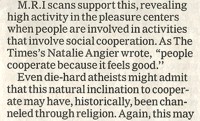I mention all this because there's a particularly good example from the NYT supplement in today's Observer, which concerns new research that suggests empathy may have a basis in evolution. That sounds fair enough to me: if you're not empathetic to other people, they won't be so empathetic towards you, and then when you need help you won't get it. You die, you don't reproduce, and so your non-empathetic qualities are not passed on to any offspring.
Here's a snippet from the article:

Uh?
Why would any kind of atheist not think religion could have helped direct the evolution of empathy? This is evidence-based reasoning, it makes sense: it's just the kind of thing with which atheists are fine. Although religious people may dogmatically refuse to countenance as worthy anything that has been touched by atheism, the reverse does not apply. Where atheists would draw the line is in suggesting that empathy came from some kind of deity; that has no evidence to support it.
If they'd said, "Even die-hard fundamentalists might admit that this natural inclination to co-operate might have, historically, evolved" then that would have been more appropriate. The difference is that no, die-hard fundamentalist would do that, because it's part of the deal with being a fundamentalist that you don't concede any ground there.
See? Good research, good conclusions, strange misunderstandings: from such dialectics societies establish their own, unique identities.